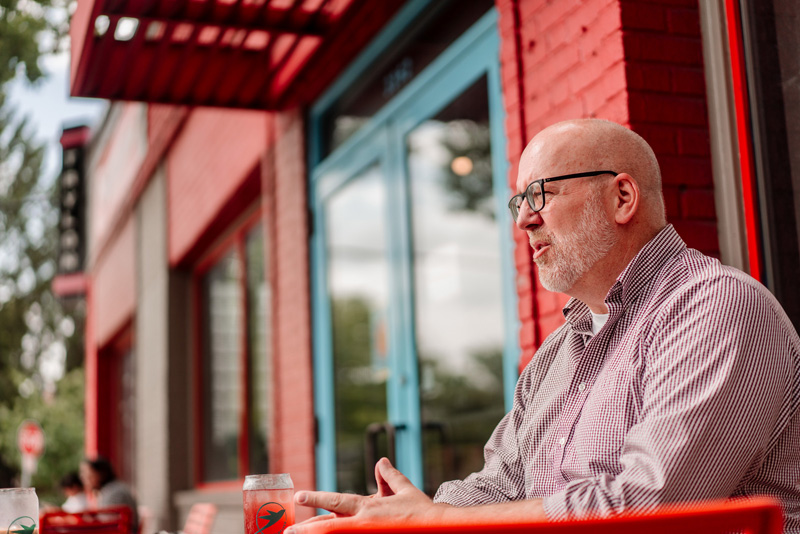PHOTOS BY BECCA DILLEY
For 23 years, Star Tribune food writer Rick Nelson has covered food and restaurants for the Star Tribune, serving as the unofficial dean of culinary journalism here in Minnesota.
He’s stepping aside from that role soon and moving on to focus on other beats, including architecture, dance, and history.
JAMES NORTON: Tell me about how you got started – what’s your superhero origin story…?
RICK NELSON: I started writing about food at the [Twin Cities] Reader in 1994. I started because of an editor, David Carr, who was the editor of the Reader and a dear friend of mine. I was writing about the performing arts at the Reader, and he didn’t like the person he’d hired to write about restaurants, and he let her go. He turned to me and said, ‘I know you love to cook, you know the latest restaurants, and love to travel – you should think about this.’
And I was like: ‘Oh, David, I don’t know…’ I thought writing about dance was going to be the future. But he was like: ‘Here’s some money, go eat at a restaurant you’ve never been to, and write about it.’ I kind of did it to humor him, but as it turned out, I loved it. I loved everything about it.
NORTON: Do you remember what that first restaurant was…?
NELSON: It was where Block E is now – it was a Tobie Nidetz restaurant. I don’t remember the name of the restaurant [1], but I really liked the food and I hated the setting. He was the guy who set up Rye Deli, and I really liked Rye Deli. I know other people hated it, but I really liked it – maybe because they were so kind to my mother, who was in the early stages of dementia, and so I always took her there, and they were very kind to her and made her French toast which she liked…
It’s funny what you like about things. They did certain things not the way certain people’s mother’s did them, and it was just like – ‘Really? You’re going to get bent out of shape about that? How about you take them at face value.’
NORTON: Were there food writers who inspired you?
NELSON: Back then, it was Ruth Reichl, who had just moved to the New York Times – I inhaled every word she wrote, I thought she was brilliant. I loved the way she told stories and talked about food through many prisms, and how food touches our lives in many ways. She was a big hero of mine, and she is – I think she’s a remarkable person.
NORTON: I feel like with a good review, you can get into the cultural context, you can get into the neighborhood its set in, you can try to quantify ambiance and hospitality, you think it: ‘I’ll go eat at a place and see what it’s like,’ but when you start uncoiling it, there’s so much there.
NELSON: Every place has a story to tell, and trying to unlock that story has been a really interesting part of my work.
NORTON: What’s the biggest change you’ve seen in Minnesota food and dining since you started?
NELSON: Well, when I started, the people who ran restaurants were the people who owned them, they weren’t the people who cooked in them. It was like the D’Amicos – they owned the restaurants, but they hired people to work in the kitchen. Restaurants were really driven from that side, and not from the cooking side of it, and that’s really a change.
I think there were some really interesting pioneering farm-to-table people, and they looked at what was going on around the country and they adapted those principles here, but I think that became sort of a requirement eventually; of course you have to source locally! We live in one of the country’s great agricultural regions, why wouldn’t you take advantage of that, and celebrate that in your cooking?
I just wrote this silly thing about hamburgers, my editor wanted me to write about new restaurants and look at it through burgers, because it’s universal and it will do really well on our website… and four out of six use Peterson Craftsman Meats … that didn’t happen 10 years ago. It didn’t matter where your beef came from, it was just a burger.
NORTON: You’ve written a lot about burgers, do you have a personal passion for them? What makes a great burger?
 NELSON: I’m not super into them, but they’re something our readers are really into, based on some studies and conversations. A friend of mine in Houston was doing a thing called Burger Friday, so I totally stole it from Alison Cook – by the way, one of the country’s great food writers. And I also used it as a way to write about restaurants I wouldn’t otherwise write about, and I knew it would be really popular with readers, which it was. I did it for four or five years until I physically couldn’t take another bite of a hamburger.
NELSON: I’m not super into them, but they’re something our readers are really into, based on some studies and conversations. A friend of mine in Houston was doing a thing called Burger Friday, so I totally stole it from Alison Cook – by the way, one of the country’s great food writers. And I also used it as a way to write about restaurants I wouldn’t otherwise write about, and I knew it would be really popular with readers, which it was. I did it for four or five years until I physically couldn’t take another bite of a hamburger.
But also, the paper commissioned a group of people in their 20s to create a focus group […] they were really interested in burgers, but what they really wanted was more suggestions about where they could go to eat that they could find quickly. And that’s why we switched from writing about hamburgers to writing about five things you should eat this week. Which is what you’ve done for years!
For me a great burger is about the bun – it should be a delicious and unusual and beautifully made bun, because I’m a huge carb freak. And it has to be about the quality of the meat. I don’t like there to be too much going on, I like things very simple. I like the simple elements to be really really delicious and that they all stand out and add up to something wonderful.
NORTON: Is there something really vital that you feel like has disappeared from the local dining scene?
NELSON: I could rattle off tons of restaurants that I miss, that I really love…
NORTON: What’s the first one that comes to mind?
NELSON: The first one that comes to mind is Lucia’s. I spent pretty much adult life at Lucia’s. I lived several blocks from there for 15 years. I had so many bad first dates at Lucia’s… I could walk into the wine bar, and my prospective date would walk in, and there was a bartender and she would just look at me and she’d just be like [silently, shaking head]: ‘No.’
I just personally loved what Lucia Watson did, and what she accomplished, and the aura in that restaurant. And I just have so many happy memories of friendship there, with my mother. You can go all over the country and say that the loss of white tablecloth, fine dining, formalized kind of experience that’s kind of universal to just about every city in the country. We don’t really have anywhere that works to those kind of standards now. Is that a huge loss? I’m not really sure that I miss it. It’s not something I personally dined in very often, but when I did, I really enjoyed it and was glad it was there.
NORTON: Is the restaurant review dead, or dying, or changing…?
 NELSON: It’s absolutely changing. One, the number of media outlets that can afford to do them has fallen dramatically. I also feel – I’d like to think there’s still a purpose for restaurant criticism because I’ve devoted so much of my career to it, but at the same time there are so many other media outlets and people out there who are writing about restaurants and creating media content around restaurants, that I don’t know that a lot of consumers see the difference. I will be interested to see how TikTok changes restaurant reviews – or has it already? I haven’t written a review in 16 months, I’m sure I’ve written my last review for the paper.
NELSON: It’s absolutely changing. One, the number of media outlets that can afford to do them has fallen dramatically. I also feel – I’d like to think there’s still a purpose for restaurant criticism because I’ve devoted so much of my career to it, but at the same time there are so many other media outlets and people out there who are writing about restaurants and creating media content around restaurants, that I don’t know that a lot of consumers see the difference. I will be interested to see how TikTok changes restaurant reviews – or has it already? I haven’t written a review in 16 months, I’m sure I’ve written my last review for the paper.
NORTON: What are we lacking here in the Upper Midwest, or Minnesota? Where are we behind?
NELSON: We lack the critical mass that a really large city like Chicago, or New York has – part of that mass comes from tourism and conventions – all the money that comes into those cities from people who want to have a really great dining experience. We don’t really have that the way those cities do.
NORTON: What’s our region’s secret strength? What’s great about food here?
NELSON: We’re really unusual in that we’re a major metropolitan area surrounded by one of the greatest agricultural regions in the country. You have the best dairy, the best animal protein, the best vegetables… we have all these resources that other cities would kill to have. We’re fortunate that way, and people here are very astute about capitalizing on their proximity to those ingredients. Because they’re close, they’re more affordable, and they’re fresher. If you go to Los Angeles, they have an amazing restaurant scene, but the food all comes from elsewhere.
NORTON: What’s your take on the rise of food influencers?
NELSON: The more people talk about restaurants, the better. It engages people and it piques people’s curiosity and interest, and that’s really cool. When I started, there were a couple media outlets that wrote about restaurants, and that’s it.
NORTON: One of the things that’s struck me, is that so much of the influencer work in food media is about who is getting hired by PR firms, essentially, to pump up their clients. It’s not as much of a democratization of the food scene as it may seem.
NELSON: Well, it’s a very buyer beware situation. Consumers don’t know that influencers are probably getting paid, or dining for free, or staying in the hotel for free. The paper pays for everything I do, and I have no financial ties to anyone. But of course you can tell I take really lousy pictures, so I’m not an influencer that way.
NORTON: Can you give me a 300-word ode to Restaurant Alma? You love Restaurant Alma a lot, I love that you love Alma, I love Alma too. Why is it such a special place?
NELSON: It’s a special place because it could only exist in Minneapolis. It’s very of its place. It’s a style of restaurant I really love – it could only be in Minneapolis, it couldn’t exist in Los Angeles, or Dallas. It’s very reflective of this place. And it’s also reflective of the people who run it, and I really like the fact that you get a sense of who Alex Roberts is when you dine in his restaurant, and that doesn’t happen all the time.
I also just personally like sitting in that room. There’s something very Midwestern about sitting in that very simple, very unassuming, but still very comfortable room, and watching people do their work in the kitchen in a very un-flashy way.
I also personally love it because that’s where I had my first date with my husband, and we had our wedding there. We celebrate our birthdays and our anniversaries there – everyone should have a restaurant like that.
I also love that he’s a local guy who trained elsewhere and brought his skills back here and made something that’s been really lasting… how many restaurants last 21, 22 years? And it’s grown and prospered.
NORTON: You’re pivoting in your new role to write more about architecture, tell me about that.
NELSON: When I was a kid, I was like: ‘I want to be an architect,’ but then I realized architects deal with mathematics and physics, and that’s so not my wheelhouse, but I’ve had a lifelong fascination with it. I was really happy when my editor Rene Sanchez wanted to create this thing on Saturdays called Streetscapes. So I’m going to contribute to that on a more regular basis, and I’m going to be doing some work in the home and garden section.
BECCA DILLEY: Is [husband and avid gardener] Robert your secret weapon…?
NELSON: I think it’ll be more about home than garden, ’cause I don’t know nothing about gardens, other than I like them.
But I’m really excited about this because I’m following in the footsteps of my friend Claude Peck, my dear friend and colleague… a couple years before he retired, he made a complete change in his work life and went from being the culture editor to the night metro editor. It was really different!
I just loved observing how invigorated he was, and he had this breath of fresh air in his work, and it made him really happy, and I thought: ‘I want to do that, too.’
This interview was abridged for length.
[1] EDITOR’S NOTE: Tobie Nidetz, via email: “Tobie’s Tavern & Grill on 6th between Hennepin and 1st Ave was a short-lived homage to old school dining, drinking, and entertainment. The décor was made up of found and reconstructed furnishings that expressed a range of time periods from post war to present day. The booths and banquettes were salvaged from the original Market BBQ when it existed in a building razed for the Target Center. A large neon sign that originally hung over the door of a bar on Hennepin Ave dominated the dining room with the word “COCKTAILS”. The bar, well stocked for the single malt scotch craze, was made from reformed vestibule pillars set with glass shelves and a mirrored back.
The comfort food menu was populated with mashed potatoes, gravies, fresh oysters, stir fried green beans, ribs, steaks and burgers. The downtown denizens of the early nineties whose relentless drive for money and success during the day were looking for the experiences of nostalgia and contentment derived from comfort foods, oversized martinis and the still illegal yet available Cuban cigars that became the specialties of Tobie’s Tavern.
Finally on most weekends it was home to a who’s who listing of local musicians playing in the second-floor music room. Acts like the late Debbie Duncan, Mick Sterling, Bobby Peterson and organist Jack McDuff.”

